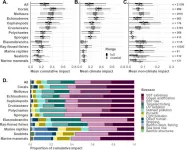(Press-News.org) Wednesday, September 18, 2024, CLEVELAND: A clinical trial has demonstrated that the cancer drug pomalidomide is safe and effective in treating hereditary hemorrhagic telangiectasia (HHT), a rare bleeding disorder that impacts more than 1 in 5,000 people worldwide. The trial, led by Keith McCrae, M.D., of Cleveland Clinic and supported by the National Institutes of Health, was stopped early because of these successful findings, and has been published in the New England Journal of Medicine.
The impetus for this trial was a single patient. About 15 years ago, Dr. McCrae, director of Benign Hematology at Cleveland Clinic, and the study’s senior author, saw a patient with HHT symptoms. There was little information about the disease at the time, according to Dr. McCrae, a hematologist and scientist.
HHT is a condition in which blood vessels become unusually tangled and twisted. This can lead to excessive nosebleeds that hallmark the disease. HHT also causes bleeding in the digestive tract and can produce serious complications in the lungs, liver and brain. Bleeding episodes worsen with age, affect quality of life, and can lead to anemia and other life-threatening conditions. There are no FDA-approved medications for long-term management of HHT.
The patient, who was in his 50s at the time, was experiencing nosebleeds and severe GI bleeding. He required several blood transfusions and multiple doses of concentrated blood plasma clotting factors every week. He had been told that his only option was surgery to remove his diseased bowel, which would have significantly affected his quality of life.
Dr. McCrae began searching for new options and found that the cancer drug thalidomide had shown positive outcomes in a few patients with similar symptoms. He treated his patient with a low dose of the drug and the bleeding almost completely stopped within two to three weeks. Dr. McCrae tried thalidomide with other patients who also showed similar HHT symptoms, and they also responded positively.
“It was amazing,” Dr. McCrae said. “I had rarely seen anything quite like that in my clinical experience, and I thought, it is important that we study this.”
Thalidomide primarily treats multiple myeloma, but can have serious side effects, so instead of pursuing large-scale research with thalidomide, Dr. McCrae used a drug with a similar chemical structure called pomalidomide, an FDA-approved drug for the treatment of bone marrow cancer. He performed a pilot study with pomalidomide, and the drug appeared effective and safe.
To test pomalidomide, researchers enrolled 144 adults with HHT at 11 U.S. medical centers between November 2019 and June 2023. CureHHT, a patient advocacy organization, actively supported enrollment in the clinical trial. All participants had moderate to severe nosebleeds requiring iron infusions or blood transfusions. RTI International, in North Carolina, was the data coordinating center for the study, and C5Research, Cleveland Clinic's Academic Research Organization (ARO), was the clinical coordinating center.
Researchers observed that patients with HHT taking pomalidomide saw a marked decrease in nosebleed severity, required fewer blood transfusions and iron infusions and experienced an improved quality of life. In June 2023, an interim analysis found pomalidomide to be effective and the trial was closed.
Researchers speculate that pomalidomide worked by blocking the growth of abnormal blood vessels. “The drug may cause the blood vessels to have a more normal structure or thicker walls, so they are less fragile,” Dr. McCrae said, but further study is needed.
“Finding a therapeutic agent that works in a rare disorder is highly uncommon, so this is a real success story,” said Andrei Kindzelski, M.D., Ph.D., program officer in the Division of Blood Diseases and Resources at the National Heart, Lung, and Blood Institute, part of the National Institutes of Health. “To date, there has been no positive trial of a therapeutic for treating HHT.”
Dr. Kindzelski said the finding has broader, life-saving implications for people with more severe forms of HHT. In those cases, malformed blood vessels can also develop in organs such as the lungs, liver and brain, which can lead to hemorrhagic stroke, bleeding in the lungs or heart failure.
Though researchers did not follow participants after the trial ended, Dr. McCrae said some of his patients who were enrolled in the study have gone up to six months without nosebleeds recurring, even though they had stopped the medication. This suggested that the drug may have promise as a long-term or intermittent treatment, he said.
Even after finding a successful treatment for this rare disease, much is still unknown about the mechanisms of HHT itself. Dr. McCrae is hoping to obtain additional funding to continue studying HHT, clarifying the mechanisms behind the disease and how pomalidomide and other drugs influence them.
"I'm optimistic that learning more about the mechanisms of how this treatment works will make a great impact in treatment of HHT hematology and our understanding of vascular malformations," he says.
This study was supported by NHLBI grants 1U24HL140090-01A1 and 1UG3HL140097-01A1.
END
Cleveland Clinic study is first to show success in treating rare blood disorder
Trial of pomalidomide in treating hereditary hemorrhagic telangiectasia stopped early due to successful findings
2024-09-18
ELSE PRESS RELEASES FROM THIS DATE:
Bone marrow cancer drug shows success in treatment of rare blood disorder
2024-09-18
A clinical trial supported by the National Institutes of Health (NIH) was stopped early after researchers found sufficient evidence that a drug used to treat bone marrow cancer and Kaposi sarcoma is safe and effective in treating hereditary hemorrhagic telangiectasia (HHT), a rare bleeding disorder that affects 1 in 5,000 people worldwide. The trial results, which are published in the New England Journal of Medicine, detail how patients with HHT given the drug, called pomalidomide, experienced a significant reduction in the severity of nosebleeds, needed fewer of the blood transfusions and iron infusions that HHT often demands, ...
Clinical trial successfully repurposes cancer drug for hereditary bleeding disorder
2024-09-18
A drug approved for treating the blood cancer multiple myeloma may offer a safe and effective way to reduce the risk of severe nosebleeds from a rare but devastating bleeding disorder. Hereditary hemorrhagic telangiectasia (HHT), the world's second-most-common inherited bleeding disorder, affects approximately 1-in-5,000 people and can have life-threatening complications, but there are currently no U.S. FDA-approved drugs to treat HHT. The PATH-HHT study, the first-ever randomized, placebo-controlled ...
UVA Engineering professor awarded $1.6M EPA grant to reduce PFAS accumulation in crops
2024-09-18
Associate professor of chemical engineering Bryan Berger received funding from the Environmental Protection Agency to reduce the impact of per- and polyfluoroalkyl substances, known as PFAS, in food and farming communities.
The award is part of the over $15 million the EPA granted to 10 institutions for PFAS reduction research, aimed at improving farm viability and increasing knowledge of PFAS accumulation.
Water sample collection for testing in Limestone, Maine. (Contributed photo)
Known as forever chemicals, PFAS are man-made substances that have been used in industry ...
UVA professor receives OpenAI grant to inform next-generation AI systems
2024-09-18
Superintelligence — AI systems that surpass human intelligence — could be just a decade away, raising urgent questions about how to ensure their safety and alignment with human values, according to OpenAI.
These AI systems could be hugely beneficial, but more sophisticated systems create the possibility for unpredictability. Misinterpreting human values or intent, algorithmic biases and security risks are all cause for concern, especially with highly developed AI systems where the potential consequences are far greater.
Yu Meng, assistant professor of computer science at ...
New website helps researchers overcome peer reviewers’ preference for animal experiments
2024-09-18
WASHINGTON, D.C.—A new website, AnimalMethodsBias.org, created by the Coalition to Illuminate and Address Animal Methods Bias (COLAAB), provides researchers guidance and resources aimed at helping them successfully publish nonanimal biomedical research by overcoming the preference some peer reviewers have for animal-based research methods.
“We recently found that half of researchers surveyed had been asked by reviewers to add an animal experiment to their otherwise animal-free study,” says Catharine ...
Can the MIND diet lower the risk of memory problems later in life?
2024-09-18
MINNEAPOLIS – People whose diet more closely resembles the MIND diet may have a lower risk of cognitive impairment, according to a study published in the September 18, 2024, online issue of Neurology®, the medical journal of the American Academy of Neurology. Results were similar for Black and white participants. These results do not prove that the MIND diet prevents cognitive impairment, they only show an association.
The MIND diet is a combination of the Mediterranean and DASH diets. It includes green leafy vegetables like spinach, ...
Some diabetes drugs tied to lower risk of dementia, Parkinson’s disease
2024-09-18
MINNEAPOLIS – A class of drugs for diabetes may be associated with a lower risk of dementia and Parkinson’s disease, according to a study published in the September 18, 2024, online issue of Neurology®, the medical journal of the American Academy of Neurology.
The study looked at sodium-glucose cotransporter-2 (SGLT2) inhibitors, which are also known as gliflozins. They lower blood sugar by causing the kidneys to remove sugar from the body through urine.
“We know that these neurodegenerative diseases like dementia and Parkinson’s disease are common and the number of cases is growing as the ...
Propagated corals reveal increased resistance to bleaching across the Caribbean during the fatal heatwave of 2023
2024-09-18
SECORE International’s Coral Seeding approach utilizes assisted reproduction, the breeding of corals, for reef restoration. This approach is realized within a training and partner network throughout the Caribbean. Now, a peer-reviewed study shows that all the effort was worthwhile: during the devastating heatwave in the Caribbean in 2023, the young, bred corals out on the reef stayed healthy while most of the remaining wild corals bleached and many died in the aftermath.
The summer of 2023 was deadly for many corals in the Caribbean Basin. An unprecedented heatwave, in intensity as well as in duration, hit the Caribbean with catastrophic ...
South African rock art possibly inspired by long-extinct species
2024-09-18
A mysterious tusked animal depicted in South African rock art might portray an ancient species preserved as fossils in the same region, according to a study published September 18, 2024 in the open-access journal PLOS ONE by Julien Benoit of the University of the Witwatersrand, Johannesburg, South Africa.
The Horned Serpent panel is a section of rock wall featuring artwork of animals and other cultural elements associated with the San people of South Africa, originally painted between 1821 and 1835. Among the painted figures is ...
Even marine animals in untouched habitats are at risk from human impacts
2024-09-18
Climate change and a range of other human impacts are putting marine animals at risk of extinction – even those living in almost pristine marine habitats and diverse coastal regions – reports a new study by Casey O'Hara of the National Center for Ecological Analysis and Synthesis at the University of California, Santa Barbara, USA, and colleagues, published September 18, 2024 in the open-access journal PLOS ONE.
Human activities on land and sea, in combination with climate change, are degrading coastal ...
LAST 30 PRESS RELEASES:
A genetic brake that forms our muscles
CHEST announces first class of certified critical care advanced practice providers awarded CCAPP Designation
Jeonbuk National University researchers develop an innovative prussian-blue based electrode for effective and efficient cesium removal
Self-organization of cell-sized chiral rotating actin rings driven by a chiral myosin
Report: US history polarizes generations, but has potential to unite
Tiny bubbles, big breakthrough: Cracking cancer’s “fortress”
A biological material that becomes stronger when wet could replace plastics
Glacial feast: Seals caught closer to glaciers had fuller stomachs
Get the picture? High-tech, low-cost lens focuses on global consumer markets
Antimicrobial resistance in foodborne bacteria remains a public health concern in Europe
Safer batteries for storing energy at massive scale
How can you rescue a “kidnapped” robot? A new AI system helps the robot regain its sense of location in dynamic, ever-changing environments
Brainwaves of mothers and children synchronize when playing together – even in an acquired language
A holiday to better recovery
Cal Poly’s fifth Climate Solutions Now conference to take place Feb. 23-27
Mask-wearing during COVID-19 linked to reduced air pollution–triggered heart attack risk in Japan
Achieving cross-coupling reactions of fatty amide reduction radicals via iridium-photorelay catalysis and other strategies
Shorter may be sweeter: Study finds 15-second health ads can curb junk food cravings
Family relationships identified in Stone Age graves on Gotland
Effectiveness of exercise to ease osteoarthritis symptoms likely minimal and transient
Cost of copper must rise double to meet basic copper needs
A gel for wounds that won’t heal
Iron, carbon, and the art of toxic cleanup
Organic soil amendments work together to help sandy soils hold water longer, study finds
Hidden carbon in mangrove soils may play a larger role in climate regulation than previously thought
Weight-loss wonder pills prompt scrutiny of key ingredient
Nonprofit leader Diane Dodge to receive 2026 Penn Nursing Renfield Foundation Award for Global Women’s Health
Maternal smoking during pregnancy may be linked to higher blood pressure in children, NIH study finds
New Lund model aims to shorten the path to life-saving cell and gene therapies
Researchers create ultra-stretchable, liquid-repellent materials via laser ablation
[Press-News.org] Cleveland Clinic study is first to show success in treating rare blood disorderTrial of pomalidomide in treating hereditary hemorrhagic telangiectasia stopped early due to successful findings





